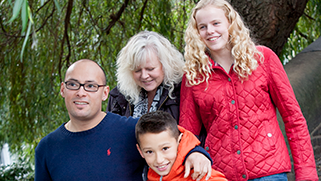
A diagnosis of Type 1 diabetes can affect the whole family. It’s important to listen to, and communicate with, all members of your family – especially any other children – and get help and support if you or anyone else needs it.
Sibling rivalry
While you’re getting to grips with your child’s diabetes, it’s easy to forget about the needs of your other children. But, they, too, will be affected by their sibling’s diagnosis. They may feel that their brother or sister is getting special treatment, worry that their sibling will get really sick or be scared that they’ll develop diabetes themselves.
Rivalry and jealousy are common in most families, and a child with diabetes can cause upset between siblings. In the early days, after diagnosis, it’s only natural for you to be anxious and focus your attention and care on your child with diabetes. But, regular hospital visits, attention to diet and everything else that goes with diabetes has a longer-term impact on all the family.
Advice for coping with sibling rivalry
- Try to listen to both sides equally and be sensitive to their claims that it’s ‘not fair’.
- Be clear about what you expect from each of them.
- Try to give them the same amount of attention.
- If you feel it’s appropriate, get siblings involved with diabetes management, so that they feel part of it.
- Try not to put family life on hold.
Separated parents
It can be a challenge to manage a child’s diabetes when they go from one home to another. Whatever your feelings about your ex, the two of you need to work together to make sure your child’s diabetes is well managed.
- making sure both of you learn about managing your child’s diabetes from your paediatric diabetes team – second-hand information can be confusing or inaccurate
- how you’ll keep each other updated about any changes to your child’s treatment or routine
- how you’ll involve new partners.
Lone parents
As a lone parent, you may have particular difficulties because all the pressures fall on you alone.
- who you can call if you need help
- who can help you in an emergency
- who can support you when you’re struggling emotionally
- who can babysit when you need time off
- involving siblings in your child’s care, being careful not to give them too much responsibility.
Extended family
When your child is diagnosed with diabetes, it’s natural for grandparents, aunts and uncles, etc to be as upset and worried as you are. They may be in constant contact, asking for updates or how they can help – or they may leave you alone to concentrate on your child.
Advice for dealing with extended family:
- Keep one person up to date. This person can then update everyone else: group texts and emails work well for this.
- Ask for the help you need. Perhaps you’d like someone to look after your other children, do a bit of shopping for you or walk the dog? People often want to help, but don’t know what to do.
- Think about the future. Your family will be living with Type 1 diabetes from now on, so how can your extended family best support you? If your child is used to staying over with relatives, it’s important that they still do so. If grandparents and other family members are worried about looking after them, try involving them in your child’s diabetes care. You could also bring them to clinic appointments to help them learn more about diabetes and ask questions for themselves. Most of all, be honest with them, tell them how you feel and ask them to help you keep your child’s life as normal as possible.
Is Type 1 diabetes hereditary? Will my other children get it?
Research has shown that Type 1 diabetes is caused by a combination of genetic and environmental factors. If one family member has Type 1 diabetes, there’s a slightly increased risk of another family member developing it, too. But, many people diagnosed have no family history of diabetes. It’s natural to worry that your other children will also develop Type 1 diabetes, but try not to let this worry affect you too much. Talk to your diabetes team or contact the Diabetes UK Helpline for support.
Diabetes support for you and your family
If you’d like some diabetes help, you can:
- ask your diabetes team for advice
- contact the Diabetes UK Helpline
- connect with other parents on the Diabetes UK Facebook page
- Visit the Diabetes Support Forum
- join a Diabetes UK group
- contact Diabetes UK’s Peer Support service to talk to specially trained volunteers with first-hand experience of living with diabetes (including parents)
